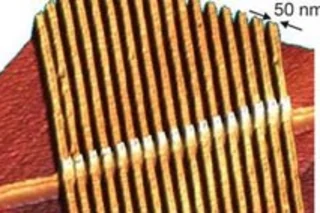"Memristors" are four decades in the making, but it turns out that this fourth kind of circuit element (beyond the inductor, capacitor, and resistor) might have more potential to change computing than even its creators first believed. In a study this week in Nature, researchers with Hewlett-Packard report that they've achieved "stateful logic" with their memristor, whose name derives from a mashup of "memory" and "resistor."
In a nutshell, stateful logic means that the 'state' of the memristor acts as both the computer and the memory. That's a pretty big change from current computers, which typically load data from memory, perform operations on it, and then send it back [Nature]
. In addition, memristors can store information even in the absence of electrical current. While an engineer named Leon O. Chua theorized memristors back in 1971, they remained strictly theoretical until HP researchers created the first one two years ago. ...














